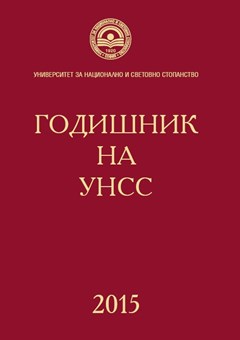Предизвикателствата на неопределеността пред философията и теорията на икономиката
Author: Борислав Градинаров
Challenges of Uncertainty to Philosophy and Theory of Economy
Borislav Gradinarov
Abstract
Разработката си поставя за задача да анализира появата и еволюцията на проблема за неопределеността в научното познание. Акцентът се поставя върху подходите и методите за изучаване на случайността, вероятността и хаоса в социалната област и по-специално във философията и теорията на икономиката. Аргументира се тезата, че вниманието към неопределеността и опитите тя да се дефинира се развиват успоредно с усложняването на обществените отношения след епохата на великите географски открития и особено с развитието на икономическите отношения след 14-15-ти век.
Пръв към проблема за случайността насочва своето внимание създателят на двустранното счетоводство Лука Пачоли, формулирайки една забавна на пръв поглед задача-игра. Тя обаче поставя началото на мощна традиция за изучаване на бъдещите несигурни събития, в която се открояват имената на Паскал, Ферма, династията Бернули, Гаус, Кетле, Галтон, Поанкаре, Дейвид Лоренц и др. Постепенно се оформя идеята, че на изследването на неопределеността не следва се гледа само като на забавни усилия за решаване на едни или други математически парадокси, а като на сериозно и с важно значение за практиката занимание.
Всички досегашни усилия да се даде една или друга концепция за природата на неопределеността и за възможните стратегии за нейното използване или овладяване все още носят белезите на просветителската парадигма на линейното мислене. Затова и до момента нито философията на икономиката, нито икономическата теория успяват да изградят задоволителна теория, която да предостави надеждни навигационни средства за ориентиране във все по-сложния, многопосочен, динамичен и изплъзващ се от точни прогнози съвременен свят.
Abstract
The work has set the task to analyze the emergence and evolution of the problem of uncertainty in scientific knowledge. The focus is on approaches and methods for the study of randomness, probability and chaos in the social field and in particular in the philosophy and theory of economics. The thesis has been argued that attention to uncertainty and attempts to define it evolve with the complexity of social relations in the era of the great geographical discoveries, and especially with the development of economic relations after 14th-15th centuries.
The first person to direct his attention to the problem of randomness is the creator of the double-entry book keeping system Luca Pacioli, formulating a seemingly fun at first glance task-game. But it marks the beginning of a powerful tradition for the study of future uncertain events, in which the names of Pascal, Fermat Bernoulli dynasty, Gauss, Quetelet, Galton, Poincare, David Lorenz and others stand out. Gradually the idea is formed that the study of uncertainty should not be viewed only as a fun effort to solve some or other mathematical paradoxes, but as a serious and important to practice effort.
All previous efforts to be given one or another conception of the nature of uncertainty and possible strategies for its use or control still bear the scars of the Enlightenment paradigm of linear thinking. That is why so far neither the philosophy of economics, nor economic theories have been able to build an adequate theory to provide reliable navigation guidance in an increasingly complex, multidirectional, dynamic and elusive of accurate predictions modern world.

